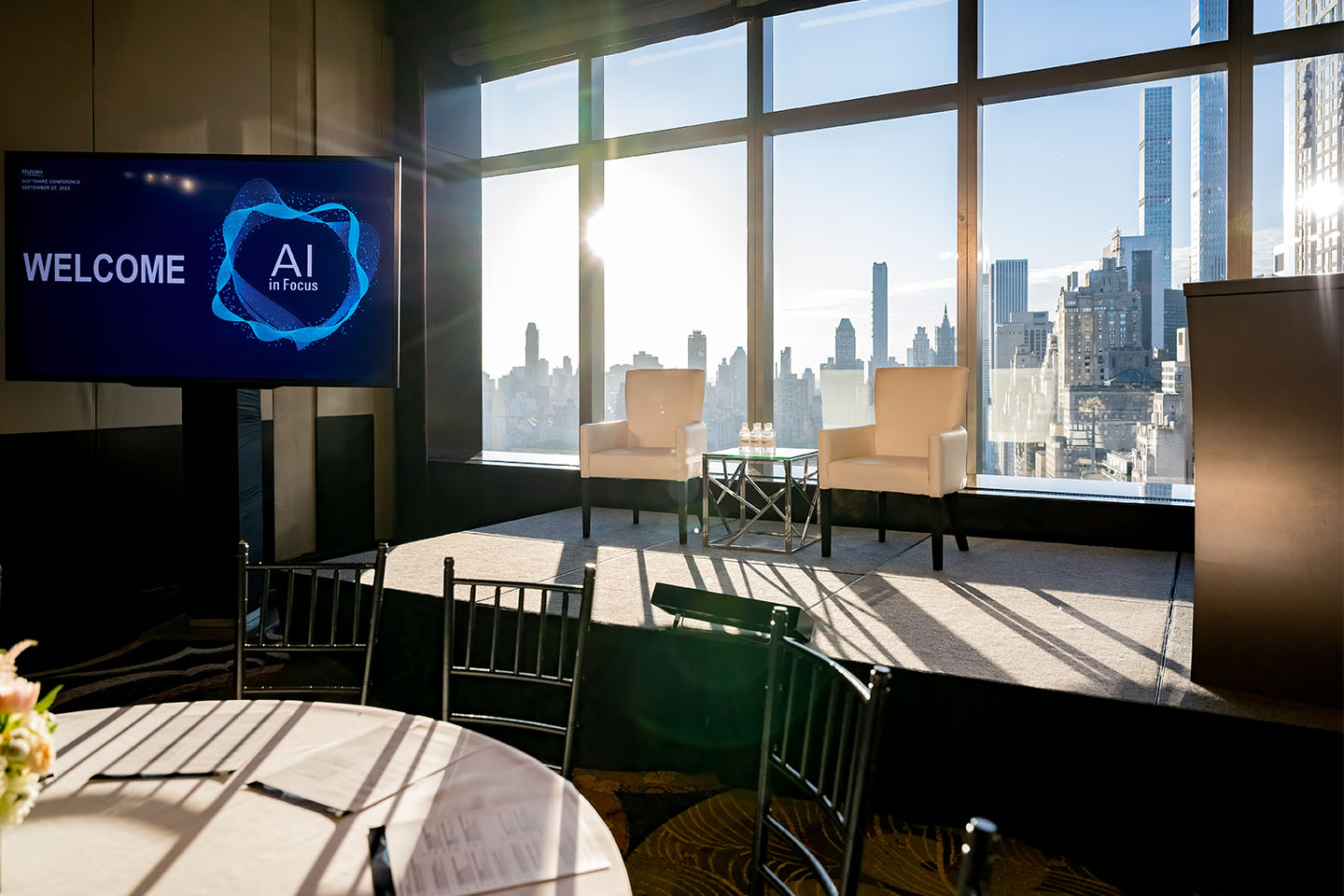The era of mass Artificial Intelligence (AI) adoption is here – and we are seeing a wave of innovation and integration of AI technology, which presages a generational shift in the way humans interact with the machines around them. That was a key takeaway from Mizuho’s AI in Focus Conference, a one-day event in New York City that saw some of the brightest minds in both the public and private sector give their insights on where the technology is headed, how companies are implementing AI into their workflows, and the impact of AI on the future of work.
Although the views on AI adoption were diverse, panelists shared a consensus that generative AI – a category of artificial intelligence that can generate content, such as text, images, audio, or other forms of data – will disrupt every sector of the economy and transform key industries such as marketing, customer service, and legal. One panelist described AI’s advent as “more important than the birth of the Internet,” while another stated it was an “industrial revolution type of change.”
These developments raise important questions: What will the future of work look like, and how can companies prepare for this new revolution? How can they train workers and educate customers to work with, and interact with, these new systems? And how can they build the foundations for an effective AI system?
Are Customers Ready to Use AI?
While fear and misunderstanding often cloud the public’s view of AI, most panelists were adamant that customers are more ready to use generative AI tools than they think.
AI has traditionally struggled imitating the decision-making process of humans, but recent advances in generative AI are accelerating the reality of machines that can think, reason, and create like humans. Large language models (“LLMs”) have significantly improved their conversational ability and increasingly, AI tools are becoming easier for workers to interact with and leverage for real-life solutions.
This trend is only expected to accelerate. Current tools such as AutoML, which automates machine learning tasks in real-time, and Databricks’ Lighthouse IQ product, which leverages generative AI to understand jargon and data usage patterns, allow workers with limited expertise in data analysis to more easily interact with, and incorporate the use of, complex datasets in their day-to-day activities. Many panelists envisioned a future in which technical expertise would not be needed to build foundational AI models, and in which well-written prompts could solve most questions.
This increasing ease of use does not mean that the risks for consumers around data privacy and harm bias are mitigated. Some panelists remarked on the media’s focus on AI doomsday scenarios, but expressed, nonetheless, that the risks are real.
Take job applications for example. As AI is integrated into the recruiting domain, candidates applying for a job must be assured that the AI filtering their application will not discriminate against them based on certain algorithms or data. Managers must ensure that they are not inputting sensitive data into LLMs, such as candidate information or performance reviews, lest they compromise confidential information.
Enterprises also face concerns around data privacy. While most of these organizations are still in the proof-of-concept (“PoC”) phase in their AI maturity, they must find ways to experiment with LLMs without giving away proprietary data. Some firms, such as Salesforce, have already released products that add a trust layer between a company’s data and the LLM - ensuring that exploratory models are not learning from the information that is entered by other companies’ proprietary data.
Should Companies Build or Buy AI Platforms?
As AI technology advances, large firms are increasingly leveraging AI to unlock the treasure trove of enterprise data in their systems. To accomplish this, companies are faced with the key decision of whether to build or buy their AI platform.
According to the panelists, for those that choose to build, fine tuning a foundational database may take several years, can cost tens of millions of dollars, and requires continual retraining and testing.
Additionally, firms that assemble a comprehensive database then have to make the database easily accessible to their employees – requiring an inversion of the initial data-gathering process. Instead, some panelists advocated for companies to stay true to their core operations and leverage products enabling them to customize an external AI provider to match their platform’s needs.
Other panelists believed that building a foundational model was a better option for specific use cases. For example, building a proprietary LLM with customer-service documents is a lower-cost process that enables agents to consult a database when they have a question. These cases also allow for workers to monitor the workflow, minimizing the risk of exposing public data.
Whatever strategy a firm decides to implement, panelists stressed the need for companies to carefully consider their intended use case before building or buying. Firms that rush to find AI solutions would do well to remember the mindset characterized by psychologist Abraham Maslow: “when all you have is a hammer, everything looks like a nail.”
“A Human in the Loop”
Of all the changes AI is slated to bring to the economy, the most profound may be in the field of worker productivity. Panelists were unanimous in their belief that generative AI would significantly decrease the time it took for workers to complete tasks.
One prediction – based on a study released by the World Economic Forum – described 20% productivity gains in the short-term, gains of 20-40% in the next 18 months, and gains of 60% in the next three years. While these figures vary by industry, they represent significant gains when compared to past technological developments. For example, the steam engine represented an 18% productivity increase.
Most panelists agreed this productivity boom would come with both costs and benefits. Although certain sectors could see significant job losses, remaining workers will be able to reduce repetitive tasks and perform responsibilities with greater success rates. For example, one panelist predicted that 50% of software jobs would be eliminated in the future, while 20% of developers would become 20 times more productive. Still, most of the panelists are not expecting to see a meaningful reduction in the number of jobs over at least the medium term.
While forecasting the convergence of human and AI in the workplace is a difficult task, all panelists believed it was necessary for humans to oversee these new systems. This concept – known as a “human in the loop” – is seen as essential as AI develops.
Panelists also stressed the importance of talent needed to build foundational models. As companies rush to implement AI, cross-functional teams have been forced to collaborate and unify in new ways. Data-fluent management is sorely lacking, and companies are looking to educate their C- level executives in its usage, to drive their organization’s platform forward.
Although AI is still in its infancy, it’s clear that the world stands on the cusp of a revolution that could not only impact different industries, but fully change the way our economy operates. From enabling text-to-speech functionality for physicians, to helping banks streamline back-office operations, to protecting children on the web by removing inappropriate images, panelists cited a diverse range of real-world examples and made clear that generative AI can be applied to effectively all applications.
As one panelist noted, this “tectonic and generational shift” could lead to a democratization of knowledge that enables ordinary citizen developers to acquire the skills of more advanced counterparts with just a fraction of the training. It may also lead to the rise of a new class of AI-powered firms – such as Anthropic and OpenAI – that have the potential to control the industry and dethrone established tech giants. While it’s impossible to predict the future, it’s evident that rapid change is coming – and the era of AI is only just getting started.





